英语时态练习题-过去完成和将来完成时
- 格式:doc
- 大小:25.50 KB
- 文档页数:5
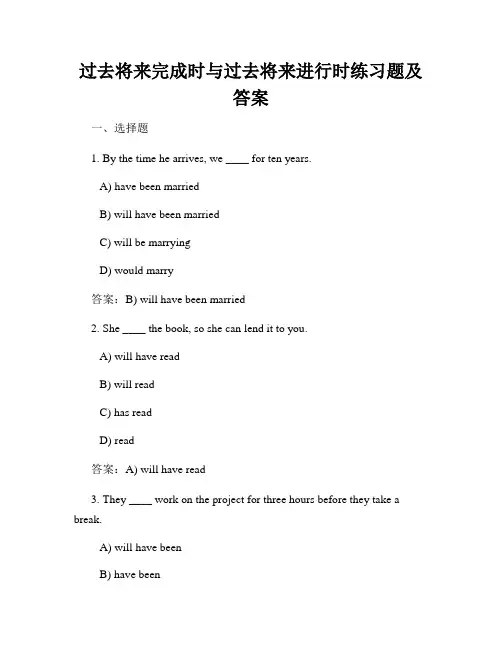
过去将来完成时与过去将来进行时练习题及答案一、选择题1. By the time he arrives, we ____ for ten years.A) have been marriedB) will have been marriedC) will be marryingD) would marry答案:B) will have been married2. She ____ the book, so she can lend it to you.A) will have readB) will readC) has readD) read答案:A) will have read3. They ____ work on the project for three hours before they take a break.A) will have beenB) have beenC) had beenD) would have been答案:A) will have been4. By the time I turn 30, I ____ three different countries.A) will have visitedB) will visitC) have visitedD) visited答案:A) will have visited5. He ____ his studies by the end of this semester.A) will have completedB) will completeC) has completedD) completed答案:A) will have completed二、填空题1. By next year, they ____ their new house.答案:will have built2. The movie ____ before we even arrive at the cinema.答案:will have started3. She ____ the conference by the time we reach the venue.答案:will have attended4. They ____ their trip by the end of this week.答案:will have planned5. By the time you wake up, I ____ breakfast.答案:will have prepared三、改错题1. By this time next month, I will have studied in this school for five years.答案:将"will have studied"改为"will have been studying"2. She is going to have finished the report by the time the meeting started.答案:将"have finished"改为"have finished"3. By the end of this year, they would have traveled to three different countries.答案:将"would have traveled"改为"will have traveled"四、问答题1. What is the difference between the past future perfect and the past future continuous?答案:The past future perfect is used to describe an action that will be completed before a specific point in the future in the past. The past future continuous, on the other hand, is used to describe an ongoing action that will be happening at a specific point in the future in the past.2. Can you give an example sentence for the past future perfect?答案:By the time I finish my studies, I will have obtained my degree.3. When do we use the past future continuous tense?答案:We use the past future continuous tense to describe an action that will be in progress at a specific point in the future in the past. For example, "By 5 PM yesterday, I will have been working for 8 hours."总结:过去将来完成时与过去将来进行时是英语语态中的两个时态,用于描述过去某个时间点之前已经完成的动作或者正在进行的动作。
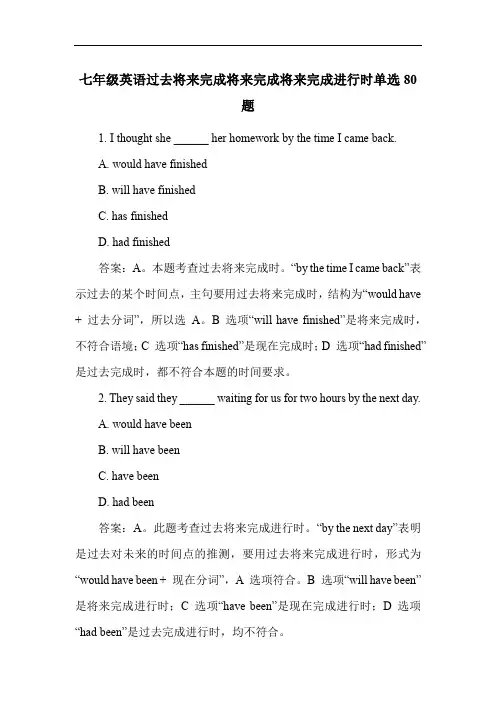
七年级英语过去将来完成将来完成将来完成进行时单选80题1. I thought she ______ her homework by the time I came back.A. would have finishedB. will have finishedC. has finishedD. had finished答案:A。
本题考查过去将来完成时。
“by the time I came back”表示过去的某个时间点,主句要用过去将来完成时,结构为“would have + 过去分词”,所以选A。
B 选项“will have finished”是将来完成时,不符合语境;C 选项“has finished”是现在完成时;D 选项“had finished”是过去完成时,都不符合本题的时间要求。
2. They said they ______ waiting for us for two hours by the next day.A. would have beenB. will have beenC. have beenD. had been答案:A。
此题考查过去将来完成进行时。
“by the next day”表明是过去对未来的时间点的推测,要用过去将来完成进行时,形式为“would have been + 现在分词”,A 选项符合。
B 选项“will have been”是将来完成进行时;C 选项“have been”是现在完成进行时;D 选项“had been”是过去完成进行时,均不符合。
3. He wondered if she ______ studying English for three years by the end of this term.A. would have beenB. will have beenC. had beenD. would be答案:A。
本题考查过去将来完成进行时。
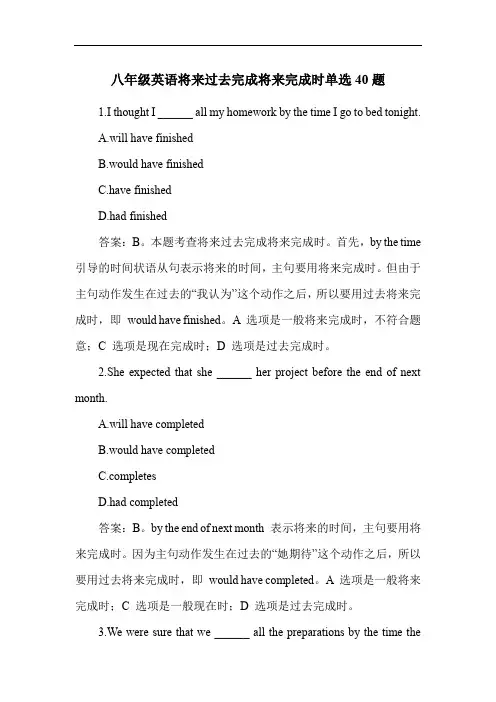
八年级英语将来过去完成将来完成时单选40题1.I thought I ______ all my homework by the time I go to bed tonight.A.will have finishedB.would have finishedC.have finishedD.had finished答案:B。
本题考查将来过去完成将来完成时。
首先,by the time 引导的时间状语从句表示将来的时间,主句要用将来完成时。
但由于主句动作发生在过去的“我认为”这个动作之后,所以要用过去将来完成时,即would have finished。
A 选项是一般将来完成时,不符合题意;C 选项是现在完成时;D 选项是过去完成时。
2.She expected that she ______ her project before the end of next month.A.will have completedB.would have completedpletesD.had completed答案:B。
by the end of next month 表示将来的时间,主句要用将来完成时。
因为主句动作发生在过去的“她期待”这个动作之后,所以要用过去将来完成时,即would have completed。
A 选项是一般将来完成时;C 选项是一般现在时;D 选项是过去完成时。
3.We were sure that we ______ all the preparations by the time theguests arrive.A.will have madeB.would have madeC.makeD.had made答案:B。
by the time 引导的时间状语从句表示将来的时间,主句要用将来完成时。
由于主句动作发生在过去的“我们确信”这个动作之后,所以要用过去将来完成时,即would have made。
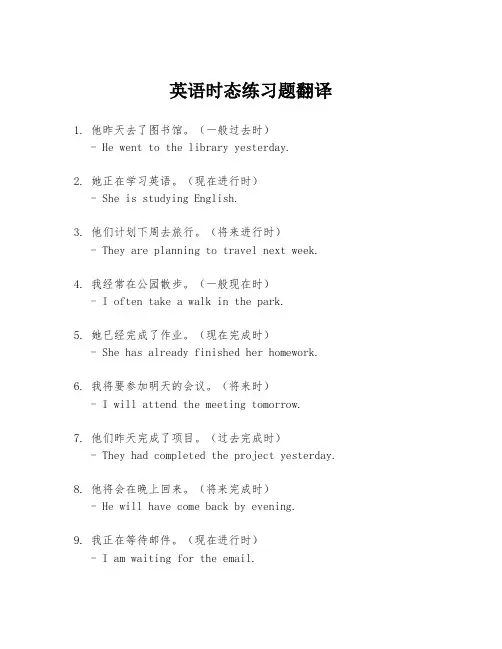
英语时态练习题翻译1. 他昨天去了图书馆。
(一般过去时)- He went to the library yesterday.2. 她正在学习英语。
(现在进行时)- She is studying English.3. 他们计划下周去旅行。
(将来进行时)- They are planning to travel next week.4. 我经常在公园散步。
(一般现在时)- I often take a walk in the park.5. 她已经完成了作业。
(现在完成时)- She has already finished her homework.6. 我将要参加明天的会议。
(将来时)- I will attend the meeting tomorrow.7. 他们昨天完成了项目。
(过去完成时)- They had completed the project yesterday.8. 他将会在晚上回来。
(将来完成时)- He will have come back by evening.9. 我正在等待邮件。
(现在进行时)- I am waiting for the email.10. 他昨天没有来,因为他生病了。
(过去进行时)- He didn't come yesterday because he was sick.11. 她将会在明天之前完成报告。
(将来完成时)- She will have finished the report by tomorrow.12. 他们正在讨论会议的安排。
(现在进行时)- They are discussing the meeting arrangements.13. 我刚刚完成了我的工作。
(现在完成时)- I have just finished my work.14. 他将会在周末之前完成这项工作。
(将来完成时)- He will have completed this work by the weekend.15. 我将要开始学习新的课程。
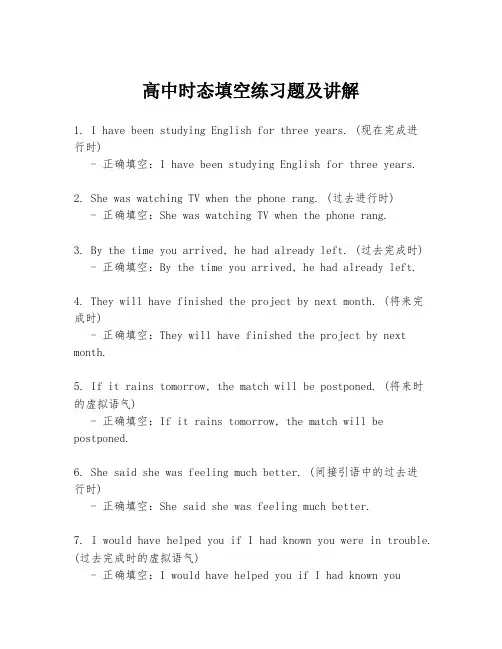
高中时态填空练习题及讲解1. I have been studying English for three years. (现在完成进行时)- 正确填空:I have been studying English for three years.2. She was watching TV when the phone rang. (过去进行时)- 正确填空:She was watching TV when the phone rang.3. By the time you arrived, he had already left. (过去完成时) - 正确填空:By the time you arrived, he had already left.4. They will have finished the project by next month. (将来完成时)- 正确填空:They will have finished the project by next month.5. If it rains tomorrow, the match will be postponed. (将来时的虚拟语气)- 正确填空:If it rains tomorrow, the match will be postponed.6. She said she was feeling much better. (间接引语中的过去进行时)- 正确填空:She said she was feeling much better.7. I would have helped you if I had known you were in trouble. (过去完成时的虚拟语气)- 正确填空:I would have helped you if I had known youwere in trouble.8. The children were playing in the garden when we got there. (过去进行时)- 正确填空:The children were playing in the garden whenwe got there.9. He had never been to Paris before he moved there last year. (过去完成时)- 正确填空:He had never been to Paris before he movedthere last year.10. I will have been working here for five years next June. (将来完成进行时)- 正确填空:I will have been working here for five years next June.讲解时态是英语中表达动作或状态发生时间的重要语法结构。
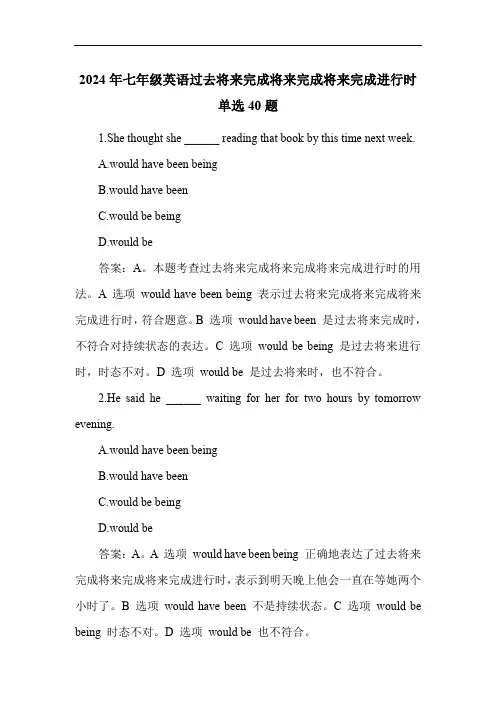
2024年七年级英语过去将来完成将来完成将来完成进行时单选40题1.She thought she ______ reading that book by this time next week.A.would have been beingB.would have beenC.would be beingD.would be答案:A。
本题考查过去将来完成将来完成将来完成进行时的用法。
A 选项would have been being 表示过去将来完成将来完成将来完成进行时,符合题意。
B 选项would have been 是过去将来完成时,不符合对持续状态的表达。
C 选项would be being 是过去将来进行时,时态不对。
D 选项would be 是过去将来时,也不符合。
2.He said he ______ waiting for her for two hours by tomorrow evening.A.would have been beingB.would have beenC.would be beingD.would be答案:A。
A 选项would have been being 正确地表达了过去将来完成将来完成将来完成进行时,表示到明天晚上他会一直在等她两个小时了。
B 选项would have been 不是持续状态。
C 选项would be being 时态不对。
D 选项would be 也不符合。
3.They believed they ______ studying English for three days straight by the end of next month.A.would have been beingB.would have beenC.would be beingD.would be答案:A。
A 选项would have been being 符合题意,强调持续学习英语三天这个状态。

八年级英语将来过去完成将来完成时单选40题1. We ____ a party next week.A. will haveB. haveC. hadD. having答案:A。
本题考查一般将来时,“next week”表示将来的时间,一般将来时的构成是“will + 动词原形”,A 选项“will have”符合;B 选项“have”是一般现在时;C 选项“had”是一般过去时;D 选项“having”不能单独作谓语。
2. Tom ____ to Beijing tomorrow.A. goesB. will goC. wentD. go答案:B。
“tomorrow”是将来的时间标志,要用一般将来时,“will + 动词原形”,A 选项“goes”是一般现在时第三人称单数形式;C 选项“went”是一般过去时;D 选项“go”是动词原形,但不符合本题的时态要求,B 选项“will go”是一般将来时。
3. They ____ football this afternoon.A. will playB. playC. playedD. playing答案:A。
“this afternoon”表示将来的时间,一般将来时的结构“will + 动词原形”,A 选项“will play”符合;B 选项“play”是一般现在时;C 选项“played”是一般过去时;D 选项“playing”不能单独作谓语。
4. -What will you do tomorrow?-I ____ my homework.A. will doB. doC. didD. doing答案:A。
问句“tomorrow”表示将来,回答也要用一般将来时,A 选项“will do”符合;B 选项“do”是一般现在时;C 选项“did”是一般过去时;D 选项“doing”不能单独作谓语。
5. She ____ a new dress next month.A. buysB. will buyC. boughtD. buy答案:B。
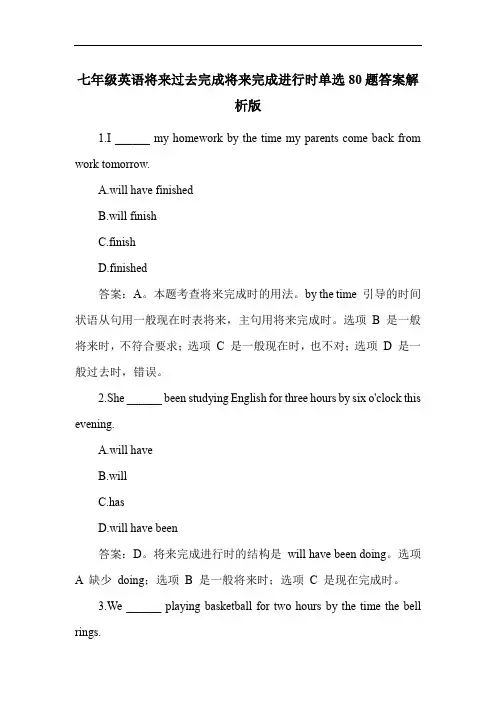
七年级英语将来过去完成将来完成进行时单选80题答案解析版1.I ______ my homework by the time my parents come back from work tomorrow.A.will have finishedB.will finishC.finishD.finished答案:A。
本题考查将来完成时的用法。
by the time 引导的时间状语从句用一般现在时表将来,主句用将来完成时。
选项B 是一般将来时,不符合要求;选项C 是一般现在时,也不对;选项D 是一般过去时,错误。
2.She ______ been studying English for three hours by six o'clock this evening.A.will haveB.willC.hasD.will have been答案:D。
将来完成进行时的结构是will have been doing。
选项A 缺少doing;选项B 是一般将来时;选项C 是现在完成时。
3.We ______ playing basketball for two hours by the time the bell rings.A.will have beenB.will beC.areD.were答案:A。
by the time 引导的时间状语从句表将来,主句用将来完成进行时。
选项B 是一般将来时;选项C 是一般现在时;选项D 是一般过去时。
4.They ______ watching TV for a long time by the end of the day.A.will have beenB.will beC.areD.were答案:A。
by the end of 后面跟时间点,通常用将来完成进行时。
选项B 是一般将来时;选项C 是一般现在时;选项D 是一般过去时。
5.He ______ reading that book for three days by tomorrow afternoon.A.will have beenB.will beC.isD.was答案:A。
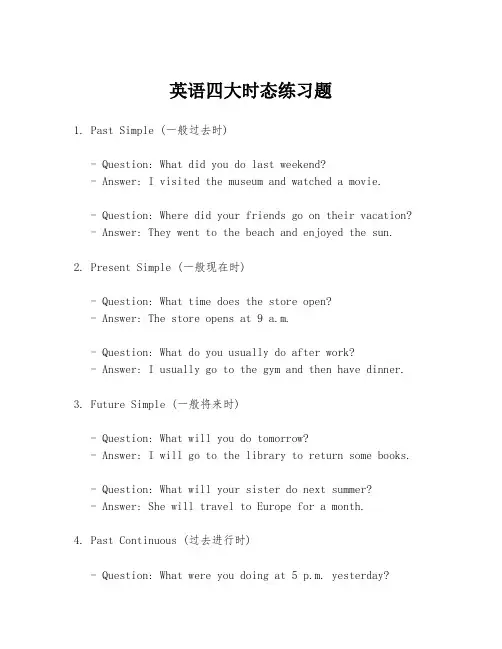
英语四大时态练习题1. Past Simple (一般过去时)- Question: What did you do last weekend?- Answer: I visited the museum and watched a movie.- Question: Where did your friends go on their vacation? - Answer: They went to the beach and enjoyed the sun.2. Present Simple (一般现在时)- Question: What time does the store open?- Answer: The store opens at 9 a.m.- Question: What do you usually do after work?- Answer: I usually go to the gym and then have dinner.3. Future Simple (一般将来时)- Question: What will you do tomorrow?- Answer: I will go to the library to return some books.- Question: What will your sister do next summer?- Answer: She will travel to Europe for a month.4. Past Continuous (过去进行时)- Question: What were you doing at 5 p.m. yesterday?- Answer: I was cooking dinner for my family.- Question: What was your brother doing when you called him?- Answer: He was playing basketball with his friends.5. Present Continuous (现在进行时)- Question: What are you doing right now?- Answer: I am working on a project for my job.- Question: What are the children doing in the garden?- Answer: They are planting flowers and watering the plants.6. Future Continuous (将来进行时)- Question: What will you be doing at this time tomorrow? - Answer: I will be attending a meeting.- Question: What will your friends be doing next weekend? - Answer: They will be hiking in the mountains.7. Present Perfect (现在完成时)- Question: Have you finished your report?- Answer: Yes, I have finished it.- Question: Has she traveled to any new countries this year?- Answer: Yes, she has traveled to Japan and Australia.8. Past Perfect (过去完成时)- Question: Had you finished your homework before the teacher arrived?- Answer: Yes, I had finished it.- Question: Had they completed the project before the deadline?- Answer: Yes, they had completed it.9. Future Perfect (将来完成时)- Question: Will you have finished your project by the end of the month?- Answer: Yes, I will have finished it by then.- Question: Will your friends have arrived by the time we get to the airport?- Answer: Yes, they will have arrived by then.。
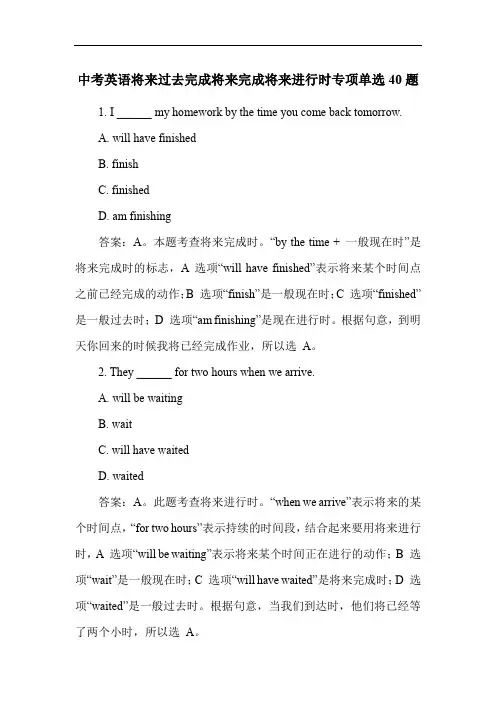
中考英语将来过去完成将来完成将来进行时专项单选40题1. I ______ my homework by the time you come back tomorrow.A. will have finishedB. finishC. finishedD. am finishing答案:A。
本题考查将来完成时。
“by the time + 一般现在时”是将来完成时的标志,A 选项“will have finished”表示将来某个时间点之前已经完成的动作;B 选项“finish”是一般现在时;C 选项“finished”是一般过去时;D 选项“am finishing”是现在进行时。
根据句意,到明天你回来的时候我将已经完成作业,所以选A。
2. They ______ for two hours when we arrive.A. will be waitingB. waitC. will have waitedD. waited答案:A。
此题考查将来进行时。
“when we arrive”表示将来的某个时间点,“for two hours”表示持续的时间段,结合起来要用将来进行时,A 选项“will be waiting”表示将来某个时间正在进行的动作;B 选项“wait”是一般现在时;C 选项“will have waited”是将来完成时;D 选项“waited”是一般过去时。
根据句意,当我们到达时,他们将已经等了两个小时,所以选A。
3. She said she ______ the work by the end of last month.A. would finishB. finishedC. had finishedD. was finishing答案:C。
本题考查过去完成时。
“by the end of + 过去时间”要用过去完成时,C 选项“had finished”表示过去某个时间之前已经完成的动作;A 选项“would finish”是过去将来时;B 选项“finished”是一般过去时;D 选项“was finishing”是过去进行时。
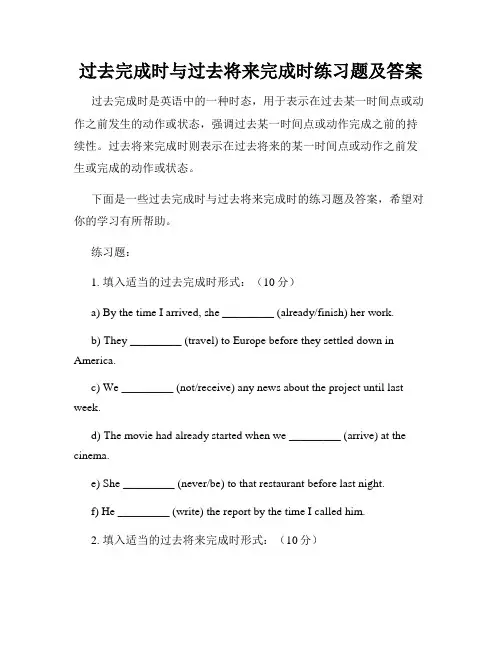
过去完成时与过去将来完成时练习题及答案过去完成时是英语中的一种时态,用于表示在过去某一时间点或动作之前发生的动作或状态,强调过去某一时间点或动作完成之前的持续性。
过去将来完成时则表示在过去将来的某一时间点或动作之前发生或完成的动作或状态。
下面是一些过去完成时与过去将来完成时的练习题及答案,希望对你的学习有所帮助。
练习题:1. 填入适当的过去完成时形式:(10分)a) By the time I arrived, she _________ (already/finish) her work.b) They _________ (travel) to Europe before they settled down in America.c) We _________ (not/receive) any news about the project until last week.d) The movie had already started when we _________ (arrive) at the cinema.e) She _________ (never/be) to that restaurant before last night.f) He _________ (write) the report by the time I called him.2. 填入适当的过去将来完成时形式:(10分)a) By this time tomorrow, I _________ (already/complete) my homework.b) She _________ (leave) the office before the meeting starts.c) We _________ (not/finish) packing by the time the moving truck arrives.d) They _________ (already/arrive) at the airport by the time the plane takes off.e) By Friday, he _________ (not/submit) his application yet.f) I _________ (not/eat) dinner by the time you come over.答案:1. 过去完成时:a) had already finishedb) had traveledc) had not receivedd) arrivede) had never beenf) had written2. 过去将来完成时:a) will have already completedb) will have leftc) will not have finishedd) will have already arrivede) will not have submittedf) will not have eaten希望上述练习题及答案对你有所帮助,可以帮助你更好地理解和掌握过去完成时与过去将来完成时的用法。
七年级英语过去将来完成将来完成将来时专项单选80题1. I thought I ____ my homework by tomorrow, but I'm not sure.A. would finishB. will finishC. finishedD. finish答案:A。
本题考查过去将来完成时。
thought 表明是过去的想法,by tomorrow 表示将来的时间,所以用过去将来完成时would finish。
B 选项will finish 是一般将来时;C 选项finished 是一般过去时;D 选项finish 是一般现在时,均不符合题意。
2. She said she ____ the project before the end of next month.A. would have completedB. will have completedC. completedD. completes答案:A。
said 表明是过去说的话,before the end of next month 是将来的时间,所以用过去将来完成时would have completed。
B 选项will have completed 是将来完成时;C 选项completed 是一般过去时;D 选项completes 是一般现在时,均不符合语境。
3. My friend believed he ____ the exam successfully by the time he graduated.A. would passB. will passC. passedD. passes答案:A。
believed 是过去的动作,by the time he graduated 是将来的时间,要用过去将来完成时would pass。
B 选项will pass 是一般将来时;C 选项passed 是一般过去时;D 选项passes 是一般现在时,不符合句子的时态要求。
将来完成时与过去将来完成时练习题及答案一、将来完成时练习题1. 请根据括号内的动词提示完成句子。
a) By the time you arrive, we (finish) ________ our work.b) They (see) ________ the movie before it is released.c) I (read) ________ this book by tomorrow.d) By next month, she (complete) ________ her research project.e) They (have) ________ dinner by the time we arrive.2. 选择正确的动词形式完成句子。
a) By the end of this year, I ________ (graduate / will have graduated) from college.b) They ________ (travelled / will have travelled) to Europe before settling down.c) By next week, she ________ (painted / will have painted) the entire house.d) We ________ (finished / will have finished) the project by the time you come back.e) I ________ (cooked / will have cooked) dinner by the time you get home.3. 用所给的动词适当形式填空。
a) By this time next year, they ________ (already / finish) their studies.b) He ________ (write) the report by tomorrow afternoon.c) I ________ (study) English for ten years by the end of this semester.d) By next month, we ________ (save) enough money for the vacation.e) They ________ (move) into their new house by the end of the month.二、过去将来完成时练习题1. 请根据括号内的动词提示完成句子。
英语时态练习题-过去完成和将来完成时过去完成时态练习题一.用动词的适当形式填空1. We _____________ (paint) the house before we ______________ (move) in.2. That rich old man _____________ (make) a will before he _____________ (die).3. They _____________ (study) the map of the country before they ________ (leave).4. The robbers _____________ (run away ) before thepolicemen_______ (arrive).5. I __________ (turn off) all the lights before I ____________ (go) to bed.6. Paul __________ (go) out with Jane after he __________ (make) a phone call.7. Tom __________ (say) he ___________ (read) the book twice.8. Our plan ____________ (fail ) because we _____________ (make) a bad mistake.9. When the chairman ______________ (finish) speaking, he _____________ (leave)the hall.10. The Reads__________ (have) lunch when I ________(get) to their house.11. When I ______________(arrive) at the station, he____________________(leave).12. We _______________(learn) about 4000 English words by the end of lastterm.13. I waited until he _______________(finish) his homework.14. We were surprised at what she ________already ______(do)15.She _________(not go) to Qingdao because she _____________ (be) therebefore.16. He ______________(not tell) you the news yet.17. He said he _____________already_________(give) the book to the teacher.18. I ______________(be) to Shanghai before.19. She told me she _________________(be) to Sanya three times.20. She _____________(play) the guitar while her sister_______________(sing). 二.句型转换1.I had sold the ticket when she came.(改否定句)2. She had sung a song to us before she danced.(改否定句)3. They began to climb the mountain after they had bought all the food and drinks.(否定)4.By 10:00 a.m, I had been very hungry. (改一般疑问)5.Lucy had already completed the project when I arrived.(改一般疑问)6.By the time he got to the airport, the plane had taken off. (改一般疑问)7..He had broken his arm when I saw him.(对划线部分提问)8.When he had read the note, he ate it. (对划线部分提问)9..Jack didn’t go to the cinema because he had seen the film. (对划线部分提问)10.We had had the toys for ten years before we gave them to the child. (对划线部分提问)11.She had written the book by the end of 1960. (对划线部分提问)12.We cooked the dumplings. We ate them up. (用过去完成时连接两句)13.Jim’s father mended the car. It was broken. (用过去完成时连接两句)14.We had our tests. Then we had a long holiday.( 用过去完成时连接两句) After we ________________________, we _____________________________ 15.He showed us the picture. Then he showed us around the house. 用过去完成时连接两句)Before he _______________________, he______________________________.练习二一、单选1 When Li Ming hurried home, he found that his mother ____already____to hospital.A has;been sentB had;sentC has;sentD had;been sent2 We ____five English songs by the end of last term.A had learnedB learnedC have learnedD will have learned3 Han Mei told me she _____lunch,so she was very hungry.A has hadB hasn't haveC have hadD hadn't had4 By the end of 1976,many buildings _____built in the city.A have beenB haveC had beenD will5 She _____her keys in the office so she had to wait until her husband ____home.A has left;comesB had left;would comeC had left;cameD left had come6 He said that it was at least ten years since I _____a good drink.A had enjoyedB was enjoyingC have enjoyedD have been enjoying7 The meeting _____when Mr. Wang _____to school.A has begun;getB has been on;getC had begun;gotD had been on;got二、填空1 When I returned home,he _____ (leave)。
英语高中八大时态练习题在学习英语的过程中,掌握时态是非常重要的一部分。
时态可以帮助我们准确地描述动作的发生时间,使得我们的表达更加清晰和准确。
本文将向大家介绍英语高中八大时态,并提供相应的练习题,以便帮助大家巩固对时态的理解和应用。
一、一般现在时(Simple Present Tense)一般现在时表示经常性的动作或客观事实,常与时间副词或频率副词连用。
练习题:1. My brother ______________ basketball every Sunday morning. (play)2. She usually ________ her homework after school. (finish)3. They ___________ football every weekend. (play)4. The train __________ at 6 pm every day. (arrive)5. He always ________ his bike to work. (ride)二、一般过去时(Simple Past Tense)一般过去时表示过去发生的动作或状态。
练习题:1. We _________ a picnic yesterday. (have)2. She _________ a book last night. (read)3. I _________ breakfast this morning. (eat)4. They _________ to the museum last week. (go)5. He ____________ in London three years ago. (live)三、一般将来时(Simple Future Tense)一般将来时表示将来某一时刻或某一动作发生。
练习题:1. I ____________ a party next weekend. (have)2. She ________ her friend tomorrow. (visit)3. They ________ to China next year. (travel)4. We _________ our exams in June. (take)5. He ____________ a doctor in the future. (become)四、现在进行时(Present Continuous Tense)现在进行时表示现阶段正在进行的动作。
英语16种时态练习题英语中的时态是描述动作或状态发生时间的方式。
一共有16种基本时态,它们由三种时态(过去、现在、将来)和四种语态(简单、进行、完成、完成进行)组合而成。
以下是一些练习题,帮助你更好地理解和运用这些时态。
1. 简单现在时(Simple Present):用来描述习惯性动作或普遍真理。
- 练习:He plays soccer every weekend.2. 现在进行时(Present Continuous):用来描述正在进行的动作。
- 练习:She is watching a movie right now.3. 简单过去时(Simple Past):用来描述过去发生的动作或状态。
- 练习:They visited the museum yesterday.4. 过去进行时(Past Continuous):用来描述过去某个时间正在进行的动作。
- 练习:I was reading a book when the phone rang.5. 简单将来时(Simple Future):用来描述将要发生的动作或状态。
- 练习:We will go to the beach next weekend.6. 将来进行时(Future Continuous):用来描述将来某个时间正在进行的动作。
- 练习:He will be working late tonight.7. 现在完成时(Present Perfect):用来描述过去开始的动作对现在有影响或结果。
- 练习:I have finished my homework.8. 现在完成进行时(Present Perfect Continuous):用来描述过去开始的动作一直持续到现在,并且可能还在继续。
- 练习:She has been working on the project for months.9. 过去完成时(Past Perfect):用来描述在过去某个时间点之前已经完成的动作。
英语时态练习题及答案Article时态是英语语法中的一个重要概念。
它用于表示动作或状态发生的时间。
正确使用时态可以提高语言表达的准确性和流畅性。
下面是一些英语时态练习题,以及它们的答案。
通过练习这些题目,可以帮助读者加深对英语时态的理解。
一、Present Tense (现在时)1. She _____________ (play) the piano.Answer: plays2. They _____________ (go) to the park every Sunday.Answer: go3. I usually _____________ (drink) coffee in the morning.Answer: drink4. The sun _____________ (rise) in the east.Answer: rises5. He _____________ (teach) English at a local school.Answer: teaches二、Past Tense (过去时)1. We _____________ (visit) London last year.Answer: visited2. She _____________ (cook) dinner for her family yesterday. Answer: cooked3. They _____________ (finish) their homework before going out. Answer: finished4. He _____________ (watch) a movie at the cinema yesterday. Answer: watched5. The cat _____________ (sleep) on the couch all day. Answer: slept三、Future Tense (将来时)1. I _____________ (visit) my grandparents next weekend. Answer: will visit2. She _____________ (start) a new job next month.Answer: will start3. They _____________ (travel) to Europe next summer. Answer: will travel4. He _____________ (meet) his friends for lunch tomorrow. Answer: will meet5. The concert _____________ (begin) at 8 pm tonight.Answer: will begin四、Present Continuous Tense (现在进行时)1. They _____________ (play) soccer in the park right now. Answer: are playing2. She _____________ (read) a book at the library. Answer: is reading3. We _____________ (study) for our exams this week. Answer: are studying4. He _____________ (clean) his room at the moment. Answer: is cleaning5. The baby _____________ (sleep) in its crib.Answer: is sleeping五、Past Continuous Tense (过去进行时)1. They _____________ (study) at the library yesterday. Answer: were studying2. She _____________ (run) in the park when it started raining. Answer: was running3. We _____________ (have) dinner when the phone rang. Answer: were having4. He _____________ (play) the guitar while she was dancing.Answer: was playing5. The students _____________ (listen) to the teacher during the lecture.Answer: were listening六、Future Continuous Tense (将来进行时)1. I _____________ (be) studying for my exams this time next week.Answer: will be2. She _____________ (be) traveling to Japan this time next year.Answer: will be3. They _____________ (be) working on their project at this time tomorrow.Answer: will be4. He _____________ (be) playing soccer with his friends at 4 pm on Saturday.Answer: will be5. The guests _____________ (be) arriving at the party when we get there.Answer: will be七、Present Perfect Tense (现在完成时)1. She _____________ (finish) her homework already.Answer: has finished2. They _____________ (visit) several countries in the past year. Answer: have visited3. I _____________ (read) that book before.Answer: have read4. He _____________ (write) five emails today.Answer: has written5. The students _____________ (learn) a lot this semester. Answer: have learned八、Past Perfect Tense (过去完成时)1. We _____________ (already / eat) dinner when she arrived. Answer: had already eaten2. She _____________ (finish) her work before leaving the office. Answer: had finished3. They _____________ (clean) the house before the guests arrived. Answer: had cleaned4. He _____________ (study) for the exam before taking a break. Answer: had studied5. The train _____________ (leave) by the time we reached the station.Answer: had left九、Future Perfect Tense (将来完成时)1. I _____________ (complete) my project by next week.Answer: will have completed2. She _____________ (finish) her book by the end of the month.Answer: will have finished3. They _____________ (prepare) dinner by the time we arrive.Answer: will have prepared4. He _____________ (graduate) from university in two years.Answer: will have graduated5. The company _____________ (expand) its operations by next year.Answer: will have expanded总结:时态在英语中非常重要,正确使用时态可以让语言表达更准确、更有流畅性。
过去完成时态练习题一.用动词的适当形式填空1. We _____________ (paint) the house before we ______________ (move) in.2. That rich old man _____________ (make) a will before he _____________ (die).3. They _____________ (study) the map of the country before they ________ (leave).4. The robbers _____________ (run away ) before the policemen_______ (arrive).5. I __________ (turn off) all the lights before I ____________ (go) to bed.6. Paul __________ (go) out with Jane after he __________ (make) a phone call.7. Tom __________ (say) he ___________ (read) the book twice.8. Our plan ____________ (fail ) because we _____________ (make) a bad mistake.9. When the chairman ______________ (finish) speaking, he _____________ (leave)the hall.10. The Reads__________ (have) lunch when I ________(get) to their house.11. When I ______________(arrive) at the station, he____________________(leave).12. We _______________(learn) about 4000 English words by the end of last term.13. I waited until he _______________(finish) his homework.14. We were surprised at what she ________already ______(do)15.She _________(not go) to Qingdao because she _____________ (be) there before.16. He ______________(not tell) you the news yet.17. He said he _____________already_________(give) the book to the teacher.18. I ______________(be) to Shanghai before.19. She told me she _________________(be) to Sanya three times.20. She _____________(play) the guitar while her sister_______________(sing). 二.句型转换1.I had sold the ticket when she came.(改否定句)2. She had sung a song to us before she danced.(改否定句)3. They began to climb the mountain after they had bought all the food and drinks.(否定)4.By 10:00 a.m, I had been very hungry. (改一般疑问)5.Lucy had already completed the project when I arrived.(改一般疑问)6.By the time he got to the airport, the plane had taken off. (改一般疑问)7..He had broken his arm when I saw him.(对划线部分提问)8.When he had read the note, he ate it. (对划线部分提问)9..Jack didn’t go to the cinema because he had seen the film. (对划线部分提问)10.We had had the toys for ten years before we gave them to the child. (对划线部分提问)11.She had written the book by the end of 1960. (对划线部分提问)12.We cooked the dumplings. We ate them up. (用过去完成时连接两句)13.Jim’s father mended the car. It was broken. (用过去完成时连接两句)14.We had our tests. Then we had a long holiday.( 用过去完成时连接两句)After we ________________________, we _____________________________ 15.He showed us the picture. Then he showed us around the house. 用过去完成时连接两句)Before he _______________________, he______________________________.练习二一、单选1 When Li Ming hurried home, he found that his mother ____already____to hospital.A has;been sentB had;sentC has;sentD had;been sent2 We ____five English songs by the end of last term.A had learnedB learnedC have learnedD will have learned3 Han Mei told me she _____lunch,so she was very hungry.A has hadB hasn't haveC have hadD hadn't had4 By the end of 1976,many buildings _____built in the city.A have beenB haveC had beenD will5 She _____her keys in the office so she had to wait until her husband ____home.A has left;comesB had left;would comeC had left;cameD left had come6 He said that it was at least ten years since I _____a good drink.A had enjoyedB was enjoyingC have enjoyedD have been enjoying7 The meeting _____when Mr. Wang _____to school.A has begun;getB has been on;getC had begun;gotD had been on;got二、填空1 When I returned home,he _____ (leave)。
2 By ten yesterday evening,she ________(finish)writing.3 He ______ (study)English for five years before he came here.4 It ____ _____ (stop)raining when I wake up this morning.5 I _____ (not read)the book because I had read it before.6 She said she____ (be)born in 1992.7 When he _____(come)to China two years ago he found people didn't understand him at all though he ________(learn)some Chinese in his own country.8 I saw Han Mei yesterday. We _____(not see)each other since left Beijing.9 When I got to his home,he_____(go)to bed.10 She asked if Mr. Liu _____ already _____(come)back.将来完成时练习题1. By the end of this year , I ____enough money for a holiday.A will saveB will be savingC will have savedD have saved2. I have been studying here for four years,by next summer _____.A shall graduateB shall be graduatedC shall be graduatingD shall have graduated3. I hope her health _______greatly by the time we come back next year.A improvesB improvedC will be improvedD will have improve4. “Are you going to Richard”s birthday party?‘“Yes. By then I ______my homework..”A had finishedB will have finishedC would have finishedD finished5. I suppose by the time I come back in ten years’ time all th ese old house______down.A will have been pulledB will be pullingC will have pulledD will be pulled6. I hope that they ______the road by the time we come back.A will have repairedB would have repairedC have repairedD had repaired。